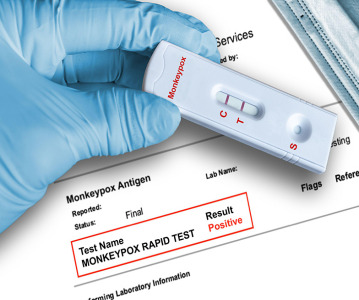Alzheimer’s-Immune System Connection Revealed
An international research team reports that they have identified a second gene variant that confers a high risk of acquiring the more common, late-onset form of Alzheimer’s disease.
An international research team reports that they have identified a second gene variant that confers a high risk of acquiring the more common, late-onset form of Alzheimer’s disease. The gene was also found to predict poorer cognitive function in older individuals who do not have Alzheimer’s disease, according to the investigators.
The study, carried out by deCODE Genetics and Illumina, along with scientists from the National Hospital of Iceland and collaborators from Holland, Germany, and the U.S., was reported today in the New England Journal of Medicine.
“The discovery of variant TREM2 is important because it confers high risk for Alzheimer’s and because the gene’s normal biological function has been shown to reduce [the] immune response that may contribute to the disease,” explained lead author Kari Stefánsson, M.D., Dr. Med., CEO of deCODE Genetics. “These combined factors make TREM2 an attractive target for drug development.”
While a number of common, low-risk variants have been reported to associate with late-onset Alzheimer’s, the ε4 allele of Apolipoprotein E, originally discovered as a risk factor for the disease in 1993, has been the most important sequence variant because of its prevalence in the population and the size of its effect on risk.
TREM2, while rarer in the general population than the ApoE ε4 allele, confers a comparable risk of the disease and plays a significant role in the central nervous system. In preclinical studies, TREM2 has been found to regulate the clearing of cell debris and amyloid protein, a component of the amyloid plaques associated with Alzheimer's disease. TREM2 has also been shown to exercise a regulatory control of inflammation, which has been associated with Alzheimer’s and cognitive decline.
“Our findings strongly implicate variant TREM2 in the pathogenesis of Alzheimer’s disease,” said Dr. Stefánsson. “Reduced TREM2 activity may lead to brain damage through increased inflammatory response.”
After carrying out a large number of genome sequencing and genotyping operations, deCODE researchers identified approximately 41 million markers, including 191,777 functional variants, from 2,261 Icelandic samples. These variants were then analyzed against the genomes of 3,550 persons with Alzheimer’s disease and a control population over the age of 85 without a diagnosis of the disease. The association analysis used to identify the variant TREM2 in the Icelandic population was then replicated against other control populations with Alzheimer’s disease maintained in the U.S., Germany, the Netherlands, and Norway.
“Using this approach, we have recently reported variants that greatly influence the risk of developing other diseases, including ovarian cancer, gliomas, gout, and sick sinus syndrome,” continued Dr. Stefánsson. “So-called big data research has evolved to a new level of sophistication due to new research tools, access to expanded and high-quality genomic data sets, and certainly the profound analytic skill level of investigators now combining sequence data and biological knowledge to find drug targets.”
The issue of which genes are involved in early-onset and late-onset Alzheimer’s is not a clearcut division. Last February, scientists the Washington University School of Medicine in St. Louis reported in PloS One that rare variants of three genes associated with the early onset of the disease—APP, PSEN1, PSEN2—have also been discovered in patients with the late-onset form.
“The presence of variants in these genes…demonstrates that factors other than the mutation can impact the age at onset,” wrote the scientists. They believe this finding could eventually lead to changes in how the disease is classified.
Related News
-
News CPHI Frankfurt 2022: Innovator Interview – DSM Biomedical
At CPHI Frankfurt we spoke to Anne-Cecile Bayne, Global Science & Innovation Lead Pharma and Medical Nutrition, and Marc Hendriks, Vice President Strategy & Business Development, on their expertise in nitrosamines and business strategy at DSM Biomedica... -
News New WHO health emergency guidelines expect full transparency from Big Pharma
The WHO are proposing a new set of pandemic guidelines to set out how future global health crises should be handled. -
News Magic mushrooms could be used to treat mental health conditions
A compound found in magic mushrooms, psilocybin, could be used to treat mental health conditions and help patients suffering with severe depression, as shown by the results of the largest study of its kind to date. -
News UK-based partnership to launch DETERMINE study into rare cancer research
UK-based CRO Quanticate is set to partner with Cancer Research UK for the launch of the DETERMINE study focused on testing a range of existing and approved drugs and therapies on rare cancers. -
News FDA approves Thermo Fisher blood tests for wheat and sesame allergies
Both tests have been approved by the US regulator for in vitro diagnostic use -
News QIAGEN launches world’s first syndromic test for monkeypox
The test can distinguish between monkeypox and other diseases that cause similar symptoms. -
News Monkeypox Update: Vaccine shortage, sewage surveillance and global testing
As concern over the monkeypox outbreak continues to rise, we take a look at major developments from the first week of August. -
News CPHI Podcast Series: The importance of novel excipients for innovative drug development
The latest episode in the CPHI Podcast Series dives into the world of novel excipients and explores their importance for innovative drug development.
Position your company at the heart of the global Pharma industry with a CPHI Online membership
-
Your products and solutions visible to thousands of visitors within the largest Pharma marketplace
-
Generate high-quality, engaged leads for your business, all year round
-
Promote your business as the industry’s thought-leader by hosting your reports, brochures and videos within your profile
-
Your company’s profile boosted at all participating CPHI events
-
An easy-to-use platform with a detailed dashboard showing your leads and performance


.png)




